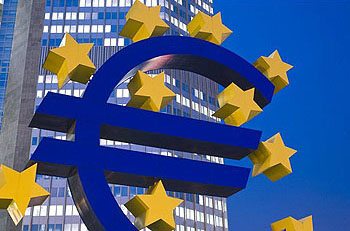 What should Europe do about its insolvent countries? Roughly speaking, the problem is fairly simple: Greece and Ireland are basically bankrupt, and Portugal might be too. Probably not Spain, but you never know. In any case, as long as these countries have to keep taking on more debt on top of all the old debt that caused their insolvency in the first place, they’ll never recover. But if they default on their debts, the banks that hold their notes will implode. This is bad, because those banks are largely French and German, and France and Germany really don’t want to see their biggest banks implode. So that means making good on the debt, which basically means that French and German taxpayers are bailing out Irish, Greek, and Portuguese taxpayers. French and German taxpayers aren’t very thrilled with this plan.
What should Europe do about its insolvent countries? Roughly speaking, the problem is fairly simple: Greece and Ireland are basically bankrupt, and Portugal might be too. Probably not Spain, but you never know. In any case, as long as these countries have to keep taking on more debt on top of all the old debt that caused their insolvency in the first place, they’ll never recover. But if they default on their debts, the banks that hold their notes will implode. This is bad, because those banks are largely French and German, and France and Germany really don’t want to see their biggest banks implode. So that means making good on the debt, which basically means that French and German taxpayers are bailing out Irish, Greek, and Portuguese taxpayers. French and German taxpayers aren’t very thrilled with this plan.
But the end is near regardless, and Felix Salmon provides an explanation of the options:
To use a US analogy, the choice facing Europe right now is whether to deal with its peripheral nations like Frannie, like AIG, or like General Motors.
The Frannie approach means a fiscal union: their debts are our debts. The AIG approach is the current “tough it out” one, where the hoped-for outcome is that a solvency crisis can be solved with liberal applications of government liquidity. But that only happens when you have strong growth — share-price growth in the case of AIG, with lots of expected future profitability, or economic growth in the case of countries like Greece, Portugal, and Ireland. And right now it’s impossible to see how a country like Greece can possibly grow its way out of its debt trap.
Finally, there’s the GM approach: restructure the debt, and get back onto a long-term sustainable footing. It’s harder for countries than it is for companies. But it might well be the least-bad option, by some large margin.
I don’t know quite how the details are going to work out, but I think Felix is right: debt restructuring is coming, like it or not. That being the case, the sooner it’s done the better. The alternative is waiting until a crisis forces the EU into action, and a crisis is always the worst and most dangerous time to do anything. It’s time to bite the bullet.


















